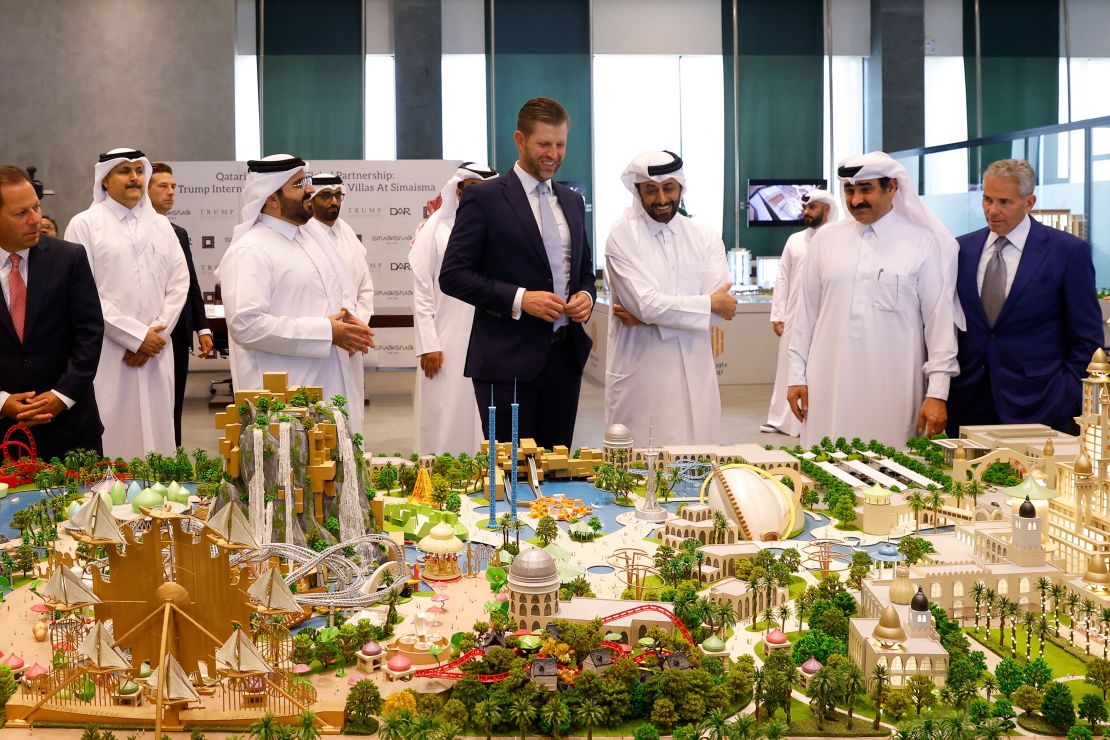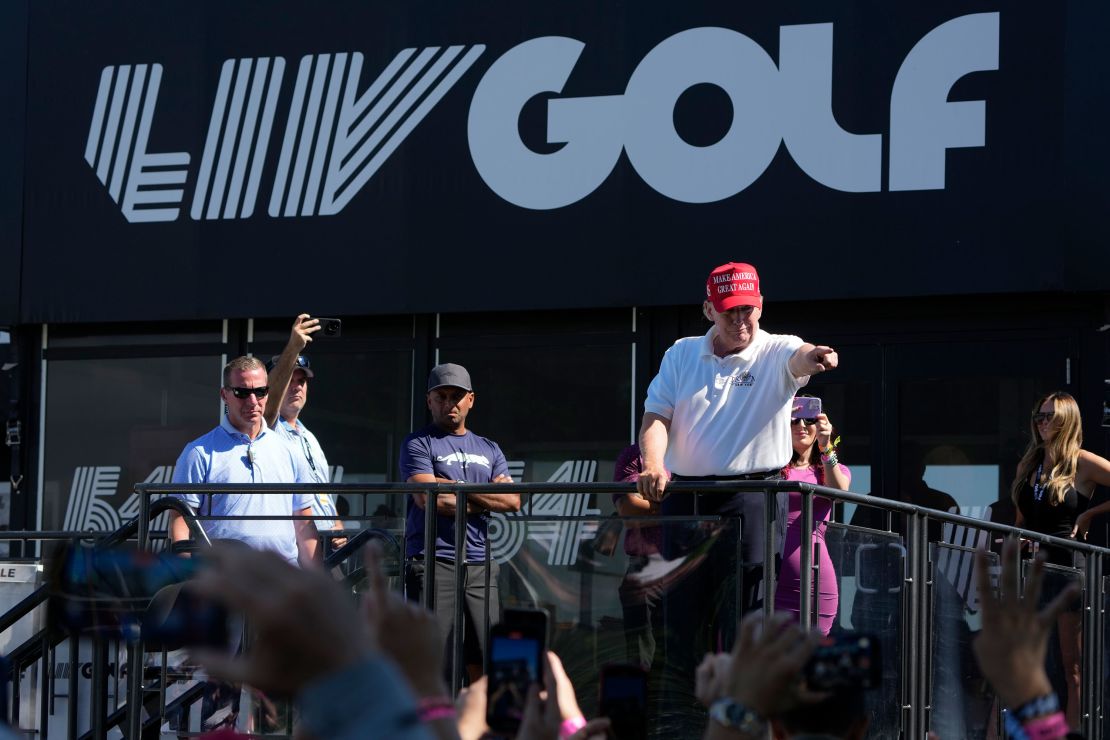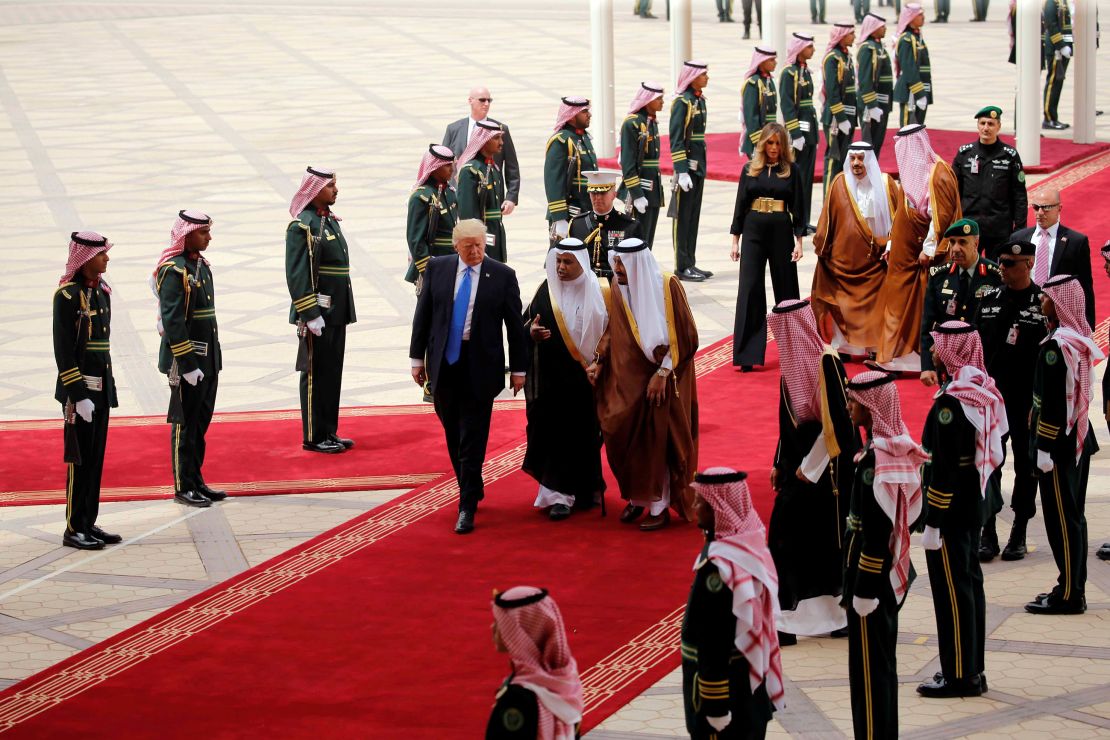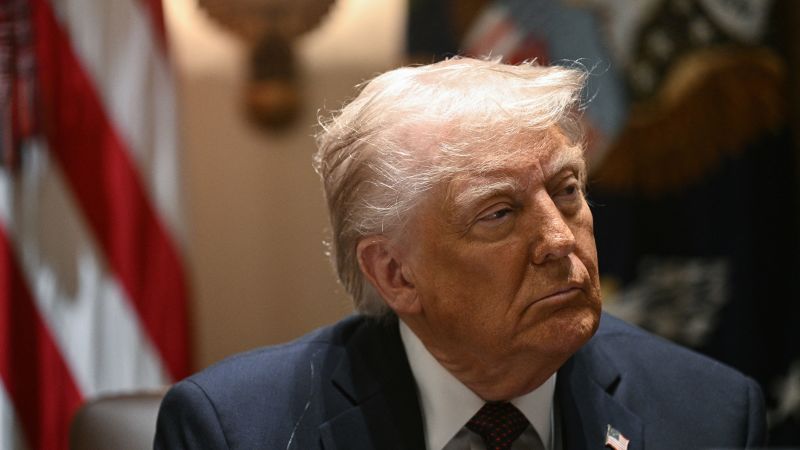CNN
—
The Trump family’s business ties to the Middle East have more than tripled since the president’s first term in office, a CNN tally of the deals has found, including a slew of new projects announced since he reclaimed the White House.
Amid the ongoing plans for luxury skyscrapers, golf courses and cryptocurrency deals in the region, Donald Trump is traveling to Saudi Arabia, Qatar and the United Arab Emirates this week not only as US president, but also as the patriarch of a family whose business empire continues to expand in that part of the world.
His financial ties to the Middle East have prompted concerns among government ethicists who say it’s difficult to determine whether he’s acting in the best interest of the United States or his pocketbook.
“When the American people elect a president, they expect that person to work for them, not for profit,” said Robert Weissman, co-president of Public Citizen, a consumer rights advocacy group. Such financial links, Weissman and other watchdogs say, create an opportunity for foreign powers to seek to sway United States policy through those lucrative business deals.
But Trump has moved full steam ahead, seemingly embracing the overlap of his personal interests and those of the nation. He’s shown he is comfortable boosting business ventures while in office – and doing so in public view. He set the tone by launching his own meme coin days before taking office, which spiked in value right after Trump offered a private dinner to its top investors last month.
“I’ve always had an instinct for making money,” Trump said in February at a conference hosted by a group launched by Saudi Arabia’s sovereign wealth fund. During the event, Trump promoted the US as ripe for investment but also touted his personal business achievements.
The Trump projects in the Middle East – many of which have been announced but not yet developed – largely involve licensing agreements with foreign developers that have partnered with the Trump Organization and paid to use the Trump name.
Past presidents have divested their businesses or put them in so-called blind trusts to avoid appearances of self-dealing. Trump has taken a different approach. His assets are in a trust managed by his children, and his son Eric Trump, executive vice president of the Trump Organization, has said the business will be walled off from the office of the presidency to avoid any ethical conflicts.
And while the Trump Organization in January pledged to make no new deals with foreign governments during the president’s second term, a recently announced deal for a Trump-branded golf course in Qatar includes a firm backed by Qatar’s sovereign wealth fund, Qatari Diar.
“Through this collaboration, we look forward to further strengthening Qatar’s position as a preferred destination,” the Qatari government minister who heads that firm said when announcing the venture earlier this month.
Eric Trump said in a press release his organization is “incredibly proud” to expand the Trump brand into Qatar through Qatari Diar, and a separate real estate company, Dar Global. Eric Trump told the New York Times last month Dar Global purchased the land for the golf course from Qatari Diar.
A Trump Organization spokesperson said the company has no affiliation, partnership or engagement with Qatari Diar or Qatar’s government and added that the company’s agreement to brand that project is with Dar Global. “The Trump Organization does not conduct business with any government entity,” spokesperson Kimberly Benza said.

President Trump, who famously said “I want America to win,” has repeatedly sought financial boosts for the US from Gulf nations. His administration boasted about securing a UAE commitment to invest $1.4 trillion in the US over a decade, and Saudi Arabia announced in January plans to expand trade and investment with the US by $600 billion over four years. In March, Trump called for Saudi Arabia to spend $1 trillion in the US.
Still, critics say the actions of Trump and his business in the first few months of his second term demonstrate a willingness to personally cash in on the presidency, and some fear foreign officials have helped him do so to advance their own agendas.
During Friday’s press briefing, White House press secretary Karoline Leavitt dismissed a question about whether the president would conduct personal business meetings on his trip.
“It’s frankly ridiculous that anyone in this room would even suggest that President Trump is doing anything for his own benefit,” Leavitt said. “This White House holds ourselves to the highest of ethical standards.”
‘Believing in the Trump brand’
Immediately after a mob of his supporters stormed the US Capitol on January 6, 2021, following his election loss, Trump became a pariah in much of the American business community. Hunkered down at Mar-a-Lago, he was banned from some social media apps. A software company stopped processing payments for his campaign website. Prominent financial firms distanced themselves. Even the hotel bearing Trump’s name in the nation’s capital was virtually empty.
“We live in the age of cancel culture,” Eric Trump said, reacting to those moves shortly after the Capitol riot.
But some business leaders stood by Trump, such as his friends in the Middle East.
“I would welcome the opportunity of expanding our relationship,” Hussain Sajwani, the head of DAMAC Properties, the developer of a Trump golf course in Dubai that opened in 2017, said a week after the January 6 insurrection.
Soon, entities in the region offered new opportunities to the Trump family.
After the PGA canceled its tournament at Trump’s New Jersey golf course, Trump partnered with LIV Golf, a new professional golf circuit backed by Saudi Arabia. The league hosts some of its tournaments at Trump properties, including one in April.
In recent years, Saudi Arabia’s sovereign wealth fund, led by Crown Prince Mohammed bin Salman, widely known as MBS, invested $2 billion in a private equity firm launched by Trump’s son-in-law Jared Kushner. Kushner and MBS developed a close personal relationship when Kushner served as an adviser to Trump during his first term. Though Kushner said he would not return to the White House, multiple Trump officials and people close to Kushner say he has been informally advising US officials on negotiations with Arab leaders, CNN reported Friday.
In the neighboring nation of Oman, the government’s tourism arm in 2022 partnered on plans to build a Trump-branded resort, along with villas and a golf club, near the capital city of Muscat. Last summer, Eric Trump and Donald Trump Jr. commemorated the launch of the joint venture by dining with Oman’s crown prince near a stage emblazoned with the words, “The Ultimate Power Move.”

While those deals materialized during Trump’s time out of office, his business’s expansion in the region appears to have been supercharged after his electoral win in November.
Dar Global, the real estate firm developing the Oman project as well as other Trump-branded towers announced before the election, has since promoted plans for two additional projects in Saudi Arabia’s Riyadh capital and the golf club in Qatar. Dar Global’s parent company, which is based in Riyadh, has committed to advancing Crown Prince MBS’ ambitious plan to modernize Saudi Arabia’s economy.
“Don’t stop believing in the Trump brand,” Dar Global’s CEO, Ziad El Chaar, said in a speech posted online this month in which he touted one of the projects planned for Dubai.
At that same event, Eric Trump referenced how his organization has done “so many projects” with Dar Global and added, “I’m not going to break any news, but I think there’s a few more to come.” He has separately commended Gulf nations for policies that favor development and reject what he has called “woke cancel culture.”
Just Sunday, President Trump wrote in a Truth Social post that his administration would accept a plane to replace its Air Force One as a “GIFT, FREE OF CHARGE.” Two people familiar with the agreement told CNN the 747-8 was from the Qatari royal family. However, a Qatari official said the plane is technically being gifted from the Qatari Ministry of Defense to the Pentagon, which would retrofit the plane for the president’s use with security features. The plane will be donated to Trump’s presidential library after he leaves office, a person familiar with the matter told CNN. Trump added that the plane will “go directly” to his presidential library after he leaves office. “I wouldn’t be using it,” he said.
Companies in the region have also boosted Trump’s crypto firm, World Liberty Financial. UAE-based DWF Labs announced in April the purchase of $25 million worth of the firm’s tokens. MGX, an Emirati-backed investment firm, agreed to use a cryptocurrency launched by the firm for a $2 billion investment in crypto exchange Binance, according to an announcement from World Liberty co-founder Zach Witkoff, whose father is Trump’s special envoy to the Middle East. The chairman of MGX is the deputy ruler of Abu Dhabi and UAE national security adviser.
That announcement from Witkoff prompted Democratic Sens. Jeffrey Merkley and Elizabeth Warren to press the US Office of Government Ethics to investigate the deal, which they stated could “open our government to a startling degree of foreign influence and the potential for a quid pro quo that could endanger national security,” according to a letter they sent last week.
“These Gulf nations are very actively trying to advance their standing in the world and having the president of the United States both do business in their country and come in an official capacity conveys very significant respectability,” said Noah Bookbinder, president of Citizens for Responsibility and Ethics in Washington. “It may be a win-win for these Gulf countries and for the president and his businesses, but it’s less clear that it’s a win for the American people.”
“This is a very delicate region of the world, where there are really important decisions that need to be made about where to deploy the military, how to engage in peace negotiations, and about economic agreements,” Bookbinder said. “You want the President making decisions based on what’s in the interest of the American people… not based on what’s going to be most helpful to his businesses.”
American presidents typically visit one of the country’s closest allies during their first major trip abroad. Since World War II, most presidents have traveled to Mexico, Canada or the United Kingdom, according to the State Department. Not Trump.
In 2017, the newly minted president traveled to Saudi Arabia where he was greeted with a lavish reception. Then, he signed an arms deal with King Salman bin Abdulaziz Al-Saud. Though Trump traveled to Italy for the pope’s funeral last month, his first official presidential trip during his second term is again to Saudi Arabia.

The United States and Saudi Arabia have a long history of diplomacy, mainly centered on a shared interest: oil. But Trump’s relationship with Saudi Arabia was particularly close during his first term, and the kingdom, which has faced allegations of human rights abuses, benefitted. When the journalist Jamal Khashoggi – a Saudi dissident and an American resident – was killed and dismembered at a Saudi consulate in Turkey after criticizing the Saudi kingdom, the United States’ Central Intelligence Agency reported that the crown prince was behind the assassination. Trump questioned his own government’s conclusion, instead backing MBS.
“It could very well be that the Crown Prince had knowledge of this tragic event — maybe he did and maybe he didn’t!” Trump wrote in a statement. The crown prince has denied involvement in Khashoggi’s killing.
Ben Freeman, who directs a foreign policy program at the Quincy Institute for Responsible Statecraft, noted that geopolitics in the region are extraordinarily complicated and Gulf nations have an array of foreign policy positions that don’t align with those of the US. He said additional deals in the region, depending on the specifics, could create reputational risks for the US and even undermine national security.
“There is seemingly this tit-for-tat where the Saudi regime, especially, makes investments in Trump… and Saudi Arabia is the first destination of his first state trip abroad,” said Freeman. “There’s a real risk that personal interests are trumping the national interest.”
CNN’s Kaitlan Collins, Kit Maher and Kyung Lah contributed to this report.

